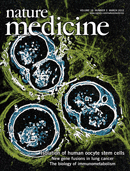导读:保持苗条的秘密可能藏在基因中。美国研究人员在老鼠身上发现“暴食基因”,这种基因会阻断身体与大脑的交流,让大脑无法得知已经吃饱的事实,从而让身体吃个不停。

基因研究
美国乔治敦大学医学中心研究人员说,他们重点关注名为“脑源性神经营养因子”(Bdnf)的基因。这种基因在老鼠和人身上都存在。先前研究显示,它与肥胖有关,但人们对它如何起效不得而知。
通常来说,人吃饱后,Bdnf基因会通过脑细胞向下丘脑发送瘦素与胰岛素等化学信号,大脑收到信号后,会向身体发出不再进食的指令。
研究人员通过人工干预让老鼠的Bdnf基因发生突变,结果发现,老鼠吃饱后,突变的Bdnf基因发送的化学信号不再能传递到下丘脑,因此,这些老鼠不知何为“饱”,食量变成普通老鼠的两倍。
英国《每日邮报》3月18日引述研究人员的话报道:“这一发现为研究出帮助大脑控制体重的新策略提供可能性。”
阻断交流
研究人员发现,早在胚胎时期,不同老鼠体内的Bdnf基因就有“长”与“短”两个版本。
那些有“长”版本Bdnf基因的老鼠能成功地通过“神经高速路”向下丘脑传递“我饱了”的信息。至于那些有“短”版本基因的老鼠,饱腹信号虽然能到达脑细胞,却无法被神经细胞的树突“截获”,也就无法被传送至下丘脑。
研究人员说:“如果Bdnf基因出现问题,神经细胞就无法互相交流,瘦素和胰岛素信号失效,胃口无法得到控制。”
下丘脑与学习和记忆有关。先前研究显示,缺乏“长”版本Bdnf基因的老鼠会出现记忆问题。
仍需等待
研究人员在最新一期《自然—医学》月刊发表报告说,他们正试图找出修正“短”版本Bdnf基因的方法,看修补基因后能否抑制胃口。他们计划接下来研制一种能够模仿Bdnf基因的药物以降低肥胖率。
英国全国肥胖论坛发言人塔姆·弗赖说,乔治敦大学医学中心的这项研究认为让瘦素信号传递至大脑是抑制胃口的关键,这种想法“方向正确”。
他说:“当前有不少研究人员正在向着同一个方向努力,试图找出阻止甚至彻底解决肥胖问题的神奇疗法……不过,即使实验在老鼠身上获得成功,要想应用于人类,还需要多年时间。”
英国剑桥大学专门研究基因与肥胖问题的教授萨达夫·法鲁基告诉英国广播公司(BBC)记者:“基因对肥胖的影响总是受到低估。两个人之间体重不同,40%至70%的因素要归于基因。”
她说,先前研究表明,完全破坏Bdnf基因会造成严重肥胖,但乔治敦大学医学中心的研究“完全在老鼠身上进行”,而这种基因突变在人类身上非常罕见,因此,研究结果对人类是否适用还不得而知。

Dendritically targeted Bdnf mRNA is essential for energy balance and response to leptin
Guey-Ying Liao, Juan Ji An, Kusumika Gharami, Emily G Waterhouse, Filip Vanevski, Kevin R Jones & Baoji Xu
Mutations in the Bdnf gene, which produces transcripts with either short or long 3′ untranslated regions (3′ UTRs), cause human obesity; however, the precise role of brain-derived neurotrophic factor (BDNF) in the regulation of energy balance is unknown. Here we show the relationship between Bdnf mRNA with a long 3′ UTR (long 3′ UTR Bdnf mRNA), leptin, neuronal activation and body weight. We found that long 3′ UTR Bdnf mRNA was enriched in the dendrites of hypothalamic neurons and that insulin and leptin could stimulate its translation in dendrites. Furthermore, mice harboring a truncated long Bdnf 3′ UTR developed severe hyperphagic obesity, which was completely reversed by viral expression of long 3′ UTR Bdnf mRNA in the hypothalamus. In these mice, the ability of leptin to activate hypothalamic neurons and inhibit food intake was compromised despite normal activation of leptin receptors. These results reveal a novel mechanism linking leptin action to BDNF expression during hypothalamic-mediated regulation of body weight, while also implicating dendritic protein synthesis in this process.
文献链接:https://www.nature.com/nm/journal/vaop/ncurrent/full/nm.2687.html








